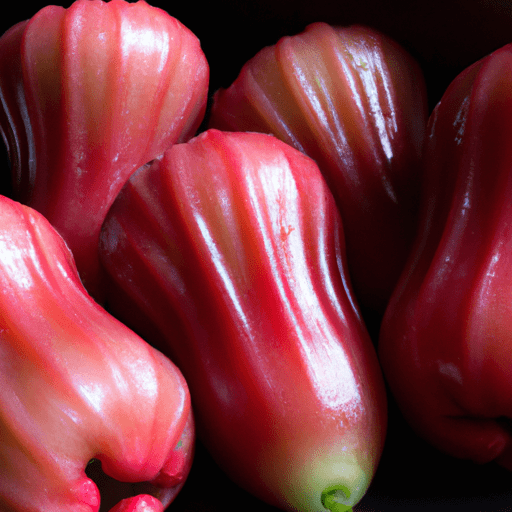Exploring the World of Rose Apples: A Unique Culinary Delight
Rose apples, with their enticing name and captivating hues, have been delighting food enthusiasts for centuries. Also known as Syzygium jambos or “jambu,” these exotic fruits are widely celebrated for their delectable taste, versatility in cooking, and impressive nutritional profile. Join us on a culinary adventure as we dive into the enticing world of rose apples.
Tantalizing Taste and Culinary Delights
Rose apples greet your palate with a refreshing burst of flavors that blend sweetness with a hint of tartness. Crisp and juicy, their texture is reminiscent of both a pear and an apple, providing a delightful balance between firmness and succulence. The flavor profile varies depending on ripeness, with unripe rose apples boasting a mildly acidic taste, while fully ripe ones offer a luscious, tropical sweetness.
Diverse Uses in Cooking
Rose apples can be used in a wide array of culinary creations, adding a unique twist to both savory and sweet dishes. Here are a few popular ways to incorporate rose apples into your cooking repertoire:
1. Salads and Salsas
The crisp texture and mild sweetness of rose apples make them an excellent addition to salads and salsas. Slice them thinly and toss them with fresh greens, herbs, and a tangy dressing for a refreshing salad with a tropical touch. Alternatively, combine them with diced tomatoes, onions, and a splash of lime juice for a delightful homemade salsa that pairs perfectly with crunchy tortilla chips.
2. Chutneys and Relishes
Take your condiment game to the next level by incorporating rose apples into chutneys and relishes. Their naturally sweet and tangy flavor lends itself well to a variety of condiments, adding a unique twist to traditional recipes. Combine diced rose apples with spices, such as ginger, cinnamon, and cloves, along with vinegar and sugar, for a tantalizing chutney that can accompany everything from grilled meats to cheese platters.
3. Juices and Beverages
Rose apples are a fantastic foundation for creating flavorful juices and beverages. Blend them with a splash of lemon or lime juice and a touch of honey for a revitalizing fruit juice that will elevate your morning routine. Alternatively, infuse their essence into cocktails and mocktails for a tropical twist, adding refreshing notes to your favorite libations.
Nutritional Powerhouse
Apart from their enticing taste and culinary versatility, rose apples also offer numerous health benefits. Packed with essential vitamins, minerals, and antioxidants, they make for a nutritious addition to your diet. Here are some noteworthy nutritional highlights:
- Vitamin C: Rose apples are abundant in vitamin C, which plays a crucial role in supporting a healthy immune system and promoting collagen production.
- Dietary Fiber: With a notable fiber content, rose apples can aid digestion and promote a feeling of satiety, making them a great choice for those looking to manage their weight or support a healthy digestive system.
- Antioxidants: These fruits boast a range of antioxidants, which help protect the body against harmful free radicals and reduce the risk of chronic diseases.
Fun Facts and Historical Significance
Uncover the intriguing world of rose apples with these fascinating facts:
- Despite their name, rose apples are not related to traditional apples. Instead, they belong to the Myrtle family and are more closely related to guava and cloves.
- Native to Southeast Asia, rose apples have a long-standing history in culinary traditions across the region. They are particularly cherished in Thai, Malaysian, and Indian cuisines.
- In some cultures, rose apples are considered symbols of love and beauty. Their delicate pink or red hues have inspired poets and artists for centuries.
Whether you’re seeking to expand your culinary horizons or simply looking to savor a unique and flavorsome fruit, rose apples are a delightful choice. With their enticing taste, culinary versatility, and impressive nutritional profile, these treasured fruits are sure to add a touch of elegance to your culinary creations. So why not embark on a fruity adventure and infuse your dishes with the exotic allure of rose apples?
Rose Apple Facts:
Origin: Rose apples, scientifically known as Syzygium jambos, are native to Southeast Asia, including countries like India, Malaysia, Indonesia, and Sri Lanka. They are also cultivated in other tropical regions of Africa, Australia, and the Americas.
Common Uses: The rose apple fruit is typically enjoyed fresh and eaten raw. Its crisp texture and mildly sweet, floral flavor make it a popular snack. It is also used in various culinary preparations, such as salads, jams, jellies, and beverages. In some countries, the fruit is also pickled or used to make wine.
Nutritional Benefits: Rose apples are a good source of vitamins A, C, and E, which are antioxidant vitamins that help protect the body against damaging free radicals. They also provide dietary fiber, potassium, and calcium. Rose apples are low in calories and are considered a healthy fruit option.
Unique Properties: Rose apples are unique in appearance with a bell-shaped fruit that ranges in color from green to yellow or red when ripe. The fruit has a thin skin and a crunchy texture. The flesh of the fruit is usually white or pinkish, tender, and juicy. It has a fragrant aroma, resembling that of a rose, which accounts for its name.
Historical Significance: Rose apple trees have been cultivated for centuries and have cultural significance in several countries. In India, the fruit is regarded as a symbol of fertility and is associated with love and romance. In Hawaii, the rose apple tree (known as Ohi’a ‘ai) is considered sacred and associated with the volcano goddess Pele. The tree and fruit are also used in traditional medicine in some regions.




Use the share button below if you liked it.
It makes me smile, when I see it.